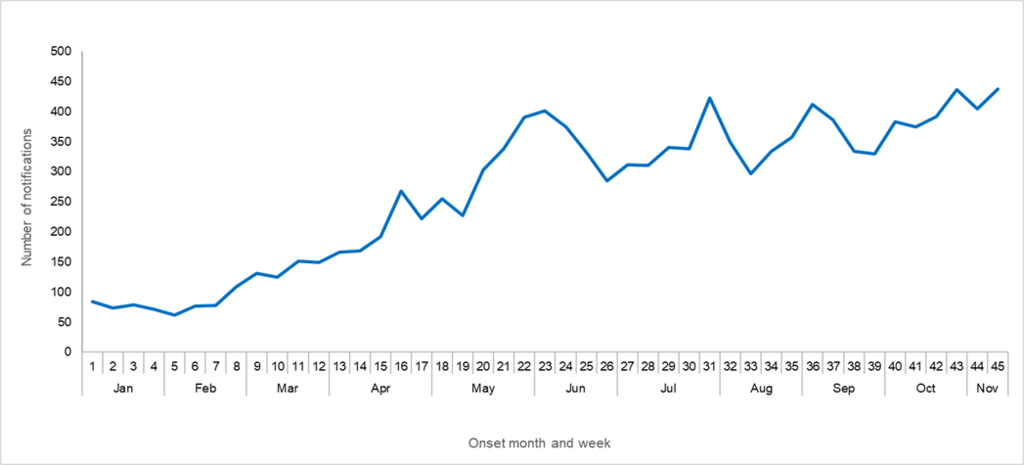
Clinical Alert | Pertussis
Pertussis notifications in Queensland are continuing to increase, particularly in children aged 5-14 years (54% of all cases since 1 January 2024).
In Queensland, the rates of pertussis in 2024 are the highest ever recorded. A significant increase in pertussis cases is being seen nationally, with highest number of cases in New South Wales and Queensland. Clinicians should be alert for signs and symptoms of pertussis. Early detection and treatment can reduce the risk of transmission.
Babies who are too young to be vaccinated and unvaccinated infants and children are most at risk of severe disease. There have been 115 notifications in Queensland year-to-date in children under 6 months (1% of all cases). Vaccination is the best prevention. Immunity wanes over time and boosters are required.
Pertussis notifications in Queensland by onset month and week, 1 January – 10 November 2024

THINK pertussis in patients with:
- Onset of runny nose, sneezing, tiredness, absent or low-grade fever.
- Dry cough that progresses to characteristic bouts of paroxysmal coughing.
Testing and treatment
- Nasopharyngeal swab for PCR testing for both children and adults when < 3 weeks from symptom onset.
- Antibiotic treatment minimises transmission to susceptible contacts and is recommended in patients of any age if the diagnosis of pertussis is made within 3 weeks of symptom onset. Patients are considered no longer infectious after 5 days of an appropriate antibiotic treatment.
- After 3 weeks of cough or other symptom onset, patients are rarely infectious and antibiotic therapy is not indicated.
- Information on antibiotic treatment of pertussis is available Pertussis | Therapeutic Guidelines.
Prevention
- Vaccinate pregnant women in each pregnancy to protect newborn infants.
- Vaccinate infants, children and adolescents according to the Immunisation Schedule Queensland.
- Recommend pertussis booster vaccination for adults every 10 years, particularly people aged ≥65 years, healthcare workers, early childhood educators and household contacts and carers of infants.
- Test and treat early, and advise patients to avoid contact with others, especially young children and infants until no longer infectious.
- Identify high risk contacts of patients diagnosed with pertussis and assess the need for antibiotic prophylaxis in collaboration with your local public health unit.
Further information
- QH fact sheet Pertussis (whooping cough).
- Pertussis | The Australian Immunisation Handbook provides clinical guidelines for health professionals on the safest and most effective use of vaccines in their practice
Immunisation Schedule Queensland.
